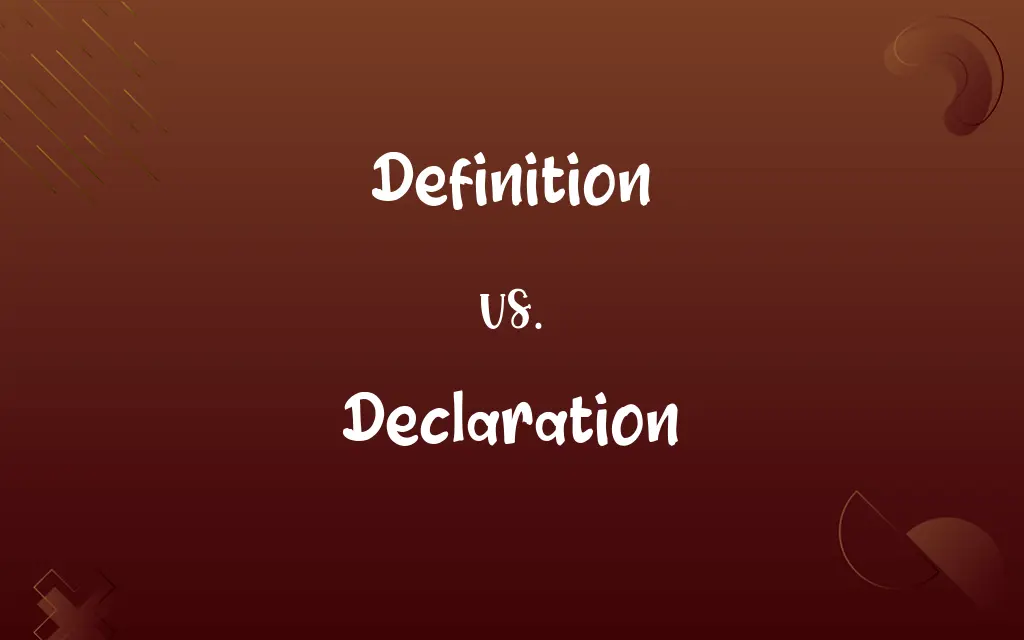Definition vs. Declaration: Know the Difference

By Hifza Nasir & Shumaila Saeed || Published on October 1, 2024
A definition in programming allocates memory and assigns a value, while a declaration introduces a variable or function, specifying its type without allocating memory or assigning a value.

Key Differences
A definition is where variables, functions, or classes are given actual substance in code; it's where memory allocation happens. For example, when a variable is defined, the compiler allocates space for it in memory. A declaration, on the other hand, simply announces the existence of an entity (variable, function, etc.) in the program, telling the compiler about its type and name without allocating memory or initializing it.
Shumaila Saeed
Oct 01, 2024
A declaration can occur multiple times for the same entity in a program, a definition can only happen once. This distinction is crucial to avoid multiple definitions, which can lead to compilation errors, such as the "multiple definition" error in C++.
Hifza Nasir
Oct 01, 2024
A declaration, often called a prototype, specifies the function's name, return type, and parameters without its body. Conversely, a function's definition includes the body where the actual code is written. This separation allows for functions to be called before their actual implementations are known to the compiler.
Hifza Nasir
Oct 01, 2024
Variables also adhere to this distinction; a variable declaration informs the compiler of its type and name, whereas a definition assigns it storage and an optional initial value. For instance, extern int x; in C declares a variable without defining it.
Hifza Nasir
Oct 01, 2024
Understanding the difference between definition and declaration is fundamental for managing scope, linkage, and storage in programming, especially in languages like C and C++, where manual memory management and type declaration are integral to the language's structure and functionality.
Dua Fatima
Oct 01, 2024
ADVERTISEMENT
Comparison Chart
ADVERTISEMENT
Definition and Declaration Definitions
Definition
Involves both declaration and allocation.
Char c = 'a'; declares and defines c simultaneously.
Shumaila Saeed
Feb 26, 2024
Declaration
Specifies function name and type for later definition.
Int sum(int, int); declares sum without defining it.
Hifza Nasir
Feb 26, 2024
Definition
Allocates memory and potentially assigns values to variables.
Int x = 5; defines x and initializes it with 5.
Shumaila Saeed
Feb 26, 2024
Declaration
Can occur multiple times for the same entity.
Extern int x; can appear in multiple files.
Hifza Nasir
Feb 26, 2024
Definition
Only occurs once for each entity in a program.
Double pi = 3.14159; uniquely defines pi.
Hifza Nasir
Feb 26, 2024
ADVERTISEMENT
Declaration
Introduces a variable or function type.
Extern int x; declares x without defining it.
Shumaila Saeed
Feb 26, 2024
Definition
In functions, includes the body and performs actions.
Void func() { /* code */ } defines func's behavior.
Hifza Nasir
Feb 26, 2024
Declaration
Does not allocate memory or assign value.
Extern char c; declares c without assigning it memory or value.
Shumaila Saeed
Feb 26, 2024
Definition
For classes, includes attributes and methods.
Class MyClass { /* details */ }; fully defines MyClass.
Shumaila Saeed
Feb 26, 2024
Declaration
Essential for managing scope and linkage.
Static int func(); declares func with internal linkage.
Shumaila Saeed
Feb 26, 2024
Repeatedly Asked Queries
How do declarations affect program compilation?
They enable the compiler to understand and verify the types of entities used throughout the program without needing their definitions at the time of compilation.
Hifza Nasir
Oct 01, 2024
What role does the 'extern' keyword play in C/C++?
It indicates that a variable's definition is elsewhere, making the statement a declaration, not a definition.
Hifza Nasir
Oct 01, 2024
How do variables behave differently in terms of declaration and definition?
A variable must be defined to allocate memory and may be declared multiple times to ensure type consistency across files.
Dua Fatima
Oct 01, 2024
Can a declaration include initialization?
No, initialization is part of a definition, not a declaration.
Hifza Nasir
Oct 01, 2024
Why are multiple declarations allowed but not multiple definitions?
Multiple declarations ensure the compiler knows an entity's type in different scopes, whereas multiple definitions would conflict in memory allocation.
Hifza Nasir
Oct 01, 2024
Is it possible to declare and define a function at the same time?
Yes, by providing the function's body along with its signature, it is both declared and defined.
Hifza Nasir
Oct 01, 2024
Can a program contain declarations without definitions?
Yes, especially in the case of external linkage where the definition is in a different file.
Dua Fatima
Oct 01, 2024
How can multiple declarations be useful in large projects?
They allow for modular programming, letting different parts of a program recognize an entity's type without having direct access to its definition.
Hifza Nasir
Oct 01, 2024
What is the main difference between a declaration and a definition?
A declaration introduces a variable or function and its type, while a definition allocates memory and, for variables, may assign a value.
Shumaila Saeed
Oct 01, 2024
What happens if a variable is declared but not defined?
The program may compile, but linking will fail due to the missing definition, resulting in an undefined reference error.
Dua Fatima
Oct 01, 2024
How does a function prototype relate to declaration and definition?
A prototype is a declaration; it specifies the function's interface without its implementation.
Shumaila Saeed
Oct 01, 2024
Why is understanding declaration vs. definition important?
It's crucial for proper program structure, avoiding linkage errors, and managing memory and scope effectively.
Hifza Nasir
Oct 01, 2024
What is the significance of initialization in the context of definitions?
Initialization assigns an initial value at the time of memory allocation, which is crucial for variables to have predictable states.
Hifza Nasir
Oct 01, 2024
What error results from multiple definitions of the same entity?
It typically leads to a "multiple definition" or "redefinition" compiler/linker error.
Shumaila Saeed
Oct 01, 2024
How do classes in C++ adhere to these concepts?
A class declaration introduces its name and existence, while its definition includes all member variables and functions, allocating memory for objects.
Dua Fatima
Oct 01, 2024
Share this page
Link for your blog / website
HTML
Link to share via messenger
About Author
Written by
Hifza NasirCo-written by
Shumaila SaeedShumaila Saeed, an expert content creator with 6 years of experience, specializes in distilling complex topics into easily digestible comparisons, shining a light on the nuances that both inform and educate readers with clarity and accuracy.








































































